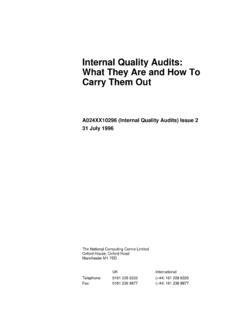Transcription of How does internal auditing maintain its independence and ...
1 The Institute of internal Auditors Page 1 of 2. The Institute of internal Auditors PRINT CLOSE. Home / The IIA / About the Profession / internal Audit FAQs How does internal auditing maintain its independence and objectivity? How does internal auditing maintain its independence and objectivity? independence : The audit charter should establish independence of the internal audit activity by the dual reporting relationship to management and the organization's most senior oversight group. Specifically, the CAE should report to executive management for assistance in establishing direction, support, and administrative interface; and typically to the audit committee for strategic direction, reinforcement, and accountability. The internal auditors should have access to records and personnel as necessary, and be allowed to employ appropriate probing techniques without impediment. OBJECTIVITY: To maintain objectivity, internal auditors should have no personal or professional involvement with or allegiance to the area being audited; and should maintain an un-biased and impartial mindset in regard to all engagements.
2 independence and objectivity are two critical components of an effective internal audit activity. independence & Objectivity "The internal auditor occupies a unique position he or she is employed by the management but is also expected to review the conduct of management which can create significant tension since the internal auditor's independence from management is necessary for the auditor to objectively assess the management s action, but the internal auditor's dependence on the management for employment is very clear.". Therefore, the internal audit activity should have a mandate through a written audit charter that establishes its purpose, authority, and responsibility to support its independence and objectivity within an organization. internal auditors are independent when they render impartial and unbiased judgment in the conduct of their engagement. To ensure this independence , best practices suggest the CAE should report directly to the audit committee or its equivalent.
3 For day to day administrative purposes, the CAE should report to the most senior executive ( , the chief executive officer [CEO]) of the organization. The CAE should have direct communication with the audit committee which reinforces the organizational status of internal auditing , enables full support and unrestricted access to organizational resources, and ensures that there is no impairment to independence . This provides sufficient authority to ensure broad audit coverage, adequate consideration of engagement communications, and appropriate action on recommendations. independence is further enhanced if the CAE reports to the board through its audit committee on the planning, execution, and results of audit activities. The audit committee is also responsible for the appointment, removal, and fixation of compensation of the CAE. The committee should safeguard the independence by approving the internal audit charter and mandate periodically.
4 Objectivity is a mental attitude which internal auditors should maintain while performing engagements. The internal auditor should have an impartial, un-biased attitude and avoid conflict of interest situations, as that would prejudice his/her ability to perform the duties objectively. The results of internal audit work should be reviewed before they are released in order to provide a reasonable assurance that the work has been performed objectively. internal auditors should not assume any operational responsibility. Objectivity can be presumed to be impaired when internal auditors perform an assurance review of any activity for which they had any authority or responsibility within the past year or a period significant enough to influence their judgment or opinion. internal auditors should not accept gifts or favors from others such as employees, clients or business associates. The internal auditors should adopt a policy that endorses their commitment to abiding by the Code of Ethics, avoiding conflicts of interest, disclosing any activity that could result in a possible conflict of interests.
5 Staff assignment of internal auditors should be rotated periodically whenever it is practicable. References: -The Professional Practices Framework IIA ; 20 Questions Directors should ask about internal Audit By Fraser and Lindsay, ECIIA Position Paper on internal auditing in Europe; and Practice Advisories 1000-1,1100-1,1110-1,1120-1. 3/26/2007.



